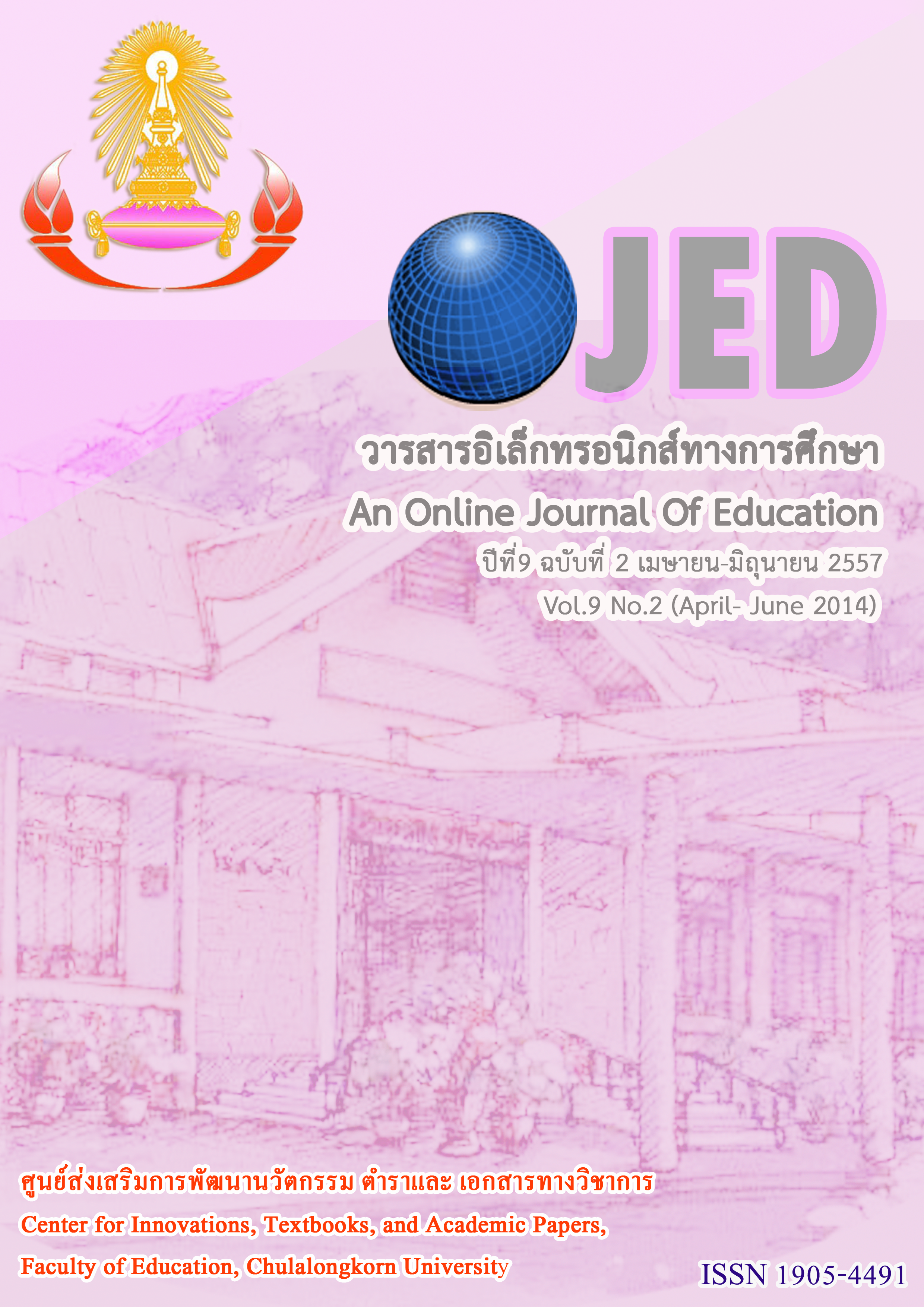การวิเคราะห์กระบวนการและปัจจัยของการประเมินคุณภาพบัณฑิตสาขาครุศาสตร์: การวิจัยพหุกรณีศึกษา
Keywords:
การประเมิน, คุณภาพบัณฑิต, สาขาครุศาสตร์, การวิจัยพหุกรณีศึกษา, ASSESSMENT, QUALITY OF EDUCATION GRADUATES, HIGHER EDUCATION INSTITUTION, MULTIPLE CASE STUDY RESEARCHAbstract
บทคัดย่อ
การวิจัยนี้มีวัตถุประสงค์เพื่อวิเคราะห์และเปรียบเทียบกระบวนการประเมินคุณภาพบัณฑิตสาขาครุศาสตร์ ของสถาบันอุดมศึกษา 2 แห่ง ที่มีพันธกิจหลักแตกต่างกัน แห่งหนึ่งเน้นการวิจัยอีกแห่งหนึ่งเน้นการพัฒนาสังคม วิธีวิจัยเป็นการวิจัยเชิงคุณภาพแบบพหุกรณีศึกษา เครื่องมือที่ใช้ได้แก่ แบบวิเคราะห์เอกสาร แนวทางการสัมภาษณ์ และแนวทางการสนทนากลุ่ม การวิเคราะห์ข้อมูลใช้วิธีการวิเคราะห์เนื้อหาและการสร้างข้อสรุปแบบอุปนัย
ผลการวิจัยพบว่า 1.กระบวนการประเมินคุณภาพบัณฑิตสาขาครุศาสตร์ของสถาบันอุดมศึกษา มี 4 ขั้นตอน ดังนี้ (1) การวางแผนและเตรียมความพร้อม ของทั้งสองสถาบันมีการประชุมวางแผนก่อนการประเมินคุณภาพบัณฑิต (2) การกาหนดมาตรฐานและเกณฑ์ในการประเมินคุณภาพบัณฑิต ของทั้งสองสถาบันมีการกาหนดเกณฑ์การประเมินคุณภาพบัณฑิตตามเกณฑ์การรับรองของคุรุสภาในมาตรฐานบัณฑิต 4 ด้าน (3) การประเมินคุณภาพบัณฑิต สถาบันทั้งสองมีการประเมินคุณภาพบัณฑิตทั้ง 4 ด้าน ดังนี้ ด้านความรู้ ทั้งสองสถาบันมีการประเมินผลตามเกณฑ์ที่มหาวิทยาลัยกาหนด โดยการสาเร็จการศึกษาต้องเรียนครบตามหลักสูตรและสอบได้คะแนนเฉลี่ยสะสม 2.oo ขึ้นไป ด้านการปฏิบัติกาสอนในสถานศึกษา ของทั้งสองสถาบัน มีคู่มือสาหรับการปฏิบัติการสอนในสถานศึกษา การวัดผลและประเมินผลอย่างเป็นระบบ ด้านการปฏิบัติตน ของทั้งสองสถาบันเน้นให้บัณฑิตครุศาสตร์ที่สาเร็จการศึกษามีคุณลักษณะที่พึงประสงค์ตามที่คณะครุศาสตร์กาหนด สอดแทรกจรรยาบรรณของวิชาชีพในการจัดการเรียนการสอน ด้านการพัฒนาคุณลักษณะความเป็นครู ของทั้งสองสถาบันจัดให้มีกิจกรรมการพัฒนาคุณลักษณะความเป็นครู ในชั้นปีที่ 1 ถึงชั้นปีที่ 5 และเป็นการบังคับให้เข้าร่วมกิจกรรม มีการบันทึกการเข้าร่วมกิจกรรม 4) รายงานผลการประเมินคุณภาพบัณฑิต พบว่าสถาบันทั้งสองแห่งมีการรายงานผลการประเมินคุณภาพบัณฑิตทั้ง 4 ด้าน อย่างเป็นรูปธรรม 2. ปัจจัยสนับสนุนของทั้งสองสถาบันคล้ายกัน คือ การดาเนินการอย่างเป็นระบบ อาจารย์มีการแลกเปลี่ยนเรียนรู้ มีการวัดผลและและการประเมินผลการศึกษาเป็นไปตามข้อบังคับสภามหาวิทยาลัย
3. ปัจจัยที่เป็นอุปสรรค สาหรับมหาวิทยาลัยเน้นการวิจัย คือ การมีภาระงานมากขึ้นของอาจารย์ เพราะต้องปรับการจัดการเรียนรู้และการประเมินผลให้สอดคล้องกับการเปลี่ยนแปลงปัจจุบัน และกิจกรรมเสริมความเป็นครูต้องหลากหลายให้สอดคล้องกับความต้องการนิสิต ส่วนมหาวิทยาลัยเน้นการพัฒนาสังคม คือ กิจกรรมการเสริมสร้างบุคลิกภาพและจิตสานึกความเป็นครูยังไม่เพียงพอกับความต้องการของนักศึกษา
คำสำคัญ: การประเมิน/คุณภาพบัณฑิต/สาขาครุศาสตร์/การวิจัยพหุกรณีศึกษา
Abstract
The objectives of this research were to analyze and compare the qualities assessment process of education graduates of higher education institutions with different main missions. A multiple case study research was employed. The case study consisted of two higher education institutions with different main missions: a research university and a community development university. Research instruments included a document analysis guideline, the interview guide and a focus group guideline. The analysis included content analysis and creation of inductive inference.
The research results were as follows: 1. The process of quality assessment of education graduates of higher education institution consisted of four stages. (1) In the planning and preparation stage – The two institutions planned and readiness of the faculty before graduates assessment; (2) In the establishing standards and criteria stages, the institution set the standard and the criteria corresponding to four aspects of the graduate quality standards of The Teachers' Council of Thailand; (3) In the quality assessment of graduates stage, the institution assessed the four aspects as follows. The knowledge aspect had to the curriculum university with G.P.A. not less than 2.00. Regarding internship in school, the institutions provided systematic practice manual, assessment and measurement. The institution focused on productive graduates and research evaluated according to two aspects: skill and competency. Regarding the development of teacher qualification, both institutions developed teacher qualifications by support activities for good manners of teacher for year 1 to year 5 which compulsory and assessed. The institution focused on productive graduates and research aimed academic activity to provide student attention in order to develop and strengthen learning of students and academic leadership. (4) Regarding the result of the graduates quality assessment of graduates stage, the institutions reported four aspects of graduates quality assessment.
2. The support factor, both institutions followed a common direction such as implement as systematic knowledge exchange and discussion among teachers, measurement and assessment of education in accordance with the regulations of institution council. 3. The obstruction factor for the research university was the further workload of teachers due to adjustment of the learning process and assessment in accordance to meet the current situation and diversity of teacher manner required to match the requirement of students. The community development in university, the strengthening of personality activity and teacher awareness were not sufficient to meet the requirements of students.
KEYWORDS: ASSESSMENT/QUALITY OF EDUCATION GRADUATES/HIGHER EDUCATION INSTITUTION/MULTIPLE CASE STUDY RESEARCH




